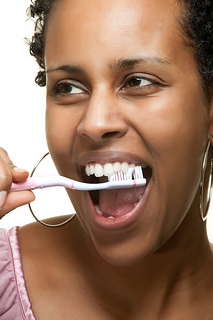My child has canker sores! How can I help?
April 27th, 2022

According to the American Association of Pediatric Density, roughly one in five children suffers from canker sores. Canker sores are small sores that appear inside the cheeks, on the lips, on the surface of the gums, and under the tongue.
Even though, canker sores are not contagious, they do tend to run in families. There are several reasons your child may be suffering from canker sores including:
- Children who have Vitamin B12, iron, and folic acid deficiencies tend to get canker sores more often than children who have normal levels of these vitamins and minerals.
- Children who suffer from food allergies are also at a higher risk for developing canker sores. It’s difficult to determine what your child may be allergic to. If you feel strongly that the canker sores are related to an allergy, then a visit to an allergist is highly recommended.
- Biting their lip or cheek can also result in a canker sore.
- Any injury to mouth, where the skin breaks can cause a canker sore.
- Brushing their teeth too hard can also be a problem.
- Your child may be sensitive to an ingredient in their toothpaste. Try switching toothpastes and see if it makes a difference.
- Emotional disturbances and stress are also factors to consider.
If your child has frequent canker sores a visit to our Walnut Creek, California office will be beneficial. Canker sores are painful and usually last about 14 days. Dr. Cynthia Stephenson may recommend one or a few of the following treatment options:
- Avoid food that is acidic, salty, and spicy.
- A toothbrush with soft bristles may be helpful.
- Avoid mouthwash and toothpaste that contain SLS.
- Do not feed your child foods that they may be allergic to.
Canker Sore Remedies
- Eating yogurt that contains Acidophilus will relieve the pain and help the canker sore heal faster.
- Put one teaspoon of baking soda in an eight-ounce glass of lukewarm water. Have your child gargle and swish it around his or her mouth several times a day. Not only does this remedy relieve the pain, the canker sore could be gone in as little as 24 hours.
- Place a wet tea bag on the sore and hold it there for a few minutes several times a day. This remedy will help with the pain and quickly heal the sore.
- Camphor, Benzocaine, Lidocaine, and Orajel are over-the-counter medications that can help.
If you have questions about your child’s canker sore, contact Dr. Cynthia Stephenson to schedule an appointment.





